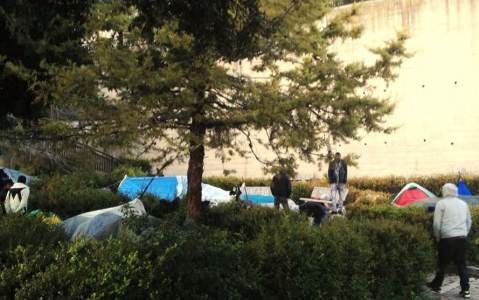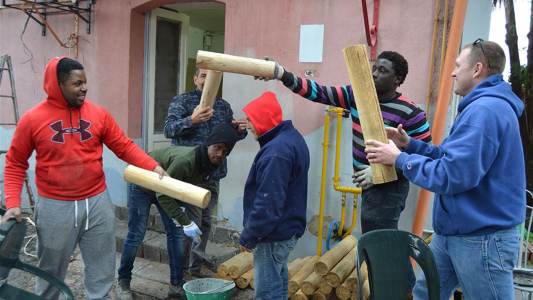High specialized reception Centre for minors in Mazara del Vallo: can it really be qualified like this?
The reception center for minors, started
in the ex-hotel Conte Ruggero II, has been managed since last June by the
cooperative “Fiori di pesco” and is authorized to the initial reception of
minors by acting as high-specialized center, with the Regional Degree of May
25th and positive reference from the municipality of Mazara del Vallo.
The “Fiori di pesco” is one of the many
cooperative which is formed ad hoc for the reconversion of tourist or hotel
establishments in reception centers, like the four-star hotel Conte Ruggero II.
According to many citizens and the local press, in the administration of this
cooperative would directly or indirectly participate different people who
manage other reception centers in the Province.
The minors who are currently hosted in
this center are 60, mainly with Gambian, Malian, Nigerian and Senegalese
nationality and almost all have arrived between last June and July. The average
residence time in this very first reception structure exceeds therefore the 3
month time limit expected for the transfer in a SPRAR* project.
It wasn’t easy to win the confidence of
the guys I met in the yard and to make sure they would directly tell me the
reasons why, on September 25th, they blocked the street next to the city
center, as a protest against the long commission time, the lack of clothes and
the bad treatment.
Only after giving them a deep personal
presentation of myself and the association Borderline Sicilia and detailed
answers to their questions regarding the asylum procedure, I managed to have
their confidence and heard what they had to tell. Only at the end of the
meeting, thanks to their confidences, I discovered the understandable reasons
of their reticence.
Their first great concern is linked to
the possession of papers: they told me that none of them had a temporary residence
permit. I asked them if they filled out the C3 and explained them what it is.
None of them had doubts answering me that no, they hadn’t and they added that
they have been accompanied to the police station only for the digital
fingerprint recognition.
They proved to have a confused idea
about how the asylum application procedure works and as I asked them if they
have ever had a meeting with a legal informer, I was told that a lawyer once
went to the center only to give information related to the host structure type
they are living in and, as it is an emergency structure, it is (or it should
be) only for a short period.
Obviously, in this regard, everybody
started to ask me why they were still there and they answered that, even when they try to get an
answer from the staff or they claim their documents or pocket money (which only
after continued protests changed from 30 euro per month to 40 and finally to
the current 50), they are told that if they give any further problem, the center
would provide to send them back to Africa or to point them out to the
territorial commission that will examine their application in order to deny them the documents.
Unfortunately, this kind of threat is not new at all
inside the centers where one tries to maintain order with the psychology of
terror but, if what referred by the guys is right, in this center they would
even go beyond this regrettable intimidation.
All the presents confirmed, reporting that they get
bad answers every time they draw attention to an issue and are looking for
reassurance regarding their deportation to Africa.
Afterwards, we talk about school. They
know it is very important for them and they told me that there is not an
internal course, but they are all attending one Italian evening course,
organized by the professional territorial Centre situated in Mazara 2 where
they autonomously go every day from 3 to 7 pm. It’s not superfluous underlying
that this area is situated 4 km away from the former hotel Ruggero and it is
well known for drug deals and local criminality.
The guys bemoan the lack of clothes,
food and the use of substandard products for personal care. One of them showed
me a back rash and told me that other three guys also suffer from the same
inflammation.
He is convinced this is a
consequence of the soap they use and as I asked him if he has informed someone about
his problem, he answered me that there would be no point in doing so.
I asked then an opinion about the health assistance
they receive and they answered that they are accompanied to the doctor, but
that the operators take action very slowly when they report something.
They tell me that one of their friends
has been at the hospital for 8 days for a stomach’s operation and nobody of the
staff has visited him. At that point, the educator comes and intervenes in the conversation
denying what the guy just affirmed and, pointing directly one of the young boys
whom I am talking to, she shouts at him that this is not true and he knows
nothing. The young boy calls his friend at the hospital who confirms what he
said at the speakerphone and told me he is spending his days without talking to
anybody, included the nurses. At that point the social assistant arrived who,
regarding the stay of the guy, affirmed she went to see him the day before and
brought him new clothes.
The manager of the center came as well,
together with the mediator and they gave me their availability to meet me once
I have finished the talk with the guys.
During the last part of our
conversation, I had the opportunity to gather 2 other particular interesting
individual cases.
There is a guy who already came 14
months ago to Italy who, after spending one month in the community “San
Francesco” in Agrigento, has been transferred after its closing first to one Centre
in Siculiana for a month an then here. This guy still finds himself after 14
month in a first reception system. I asked him whether he was told the reasons
of these transfers and he replied that nobody has explained him anything and
that he still does not know how much he still has to wait before getting
transferred again.
I detect another young guy, who seems
younger than the average of the guys living in the center, but I can barely
understand his provenience. He is Eritrean and does not speak English; the
other guys told me he does not talk to anybody because he can’t speak any of
the common languages. Nobody understands him and so he lives in isolation.
I say goodbye to the guys and go talking
with the manager, who shows great availability and just as much confusion about
the general management of the center and the asylum application procedures. As I asked him
explanations about the compilation of the form C3, he talks about the
prefecture. After telling him this procedure is exclusive jurisdiction of the
police headquarter, I asked him why none of the guy has filled it out yet. He
tells me he doesn’t know and that for all those matters I should talk to the
social worker (I would have done it with great pleasure, but she had already
gone home. I left my personal contacts and those of the association in order to
be contacted again, giving my availability to come back to the Centre, but
after 10 days I haven’t been called back yet).
He himself invites me to visit the
structure which, as a former 4 star hotel, is very beautiful and clean. He
brings me to the common room and to the canteen where are consumed the meals
prepared in the intern kitchen.
We go through the kitchen in full
activity. It also looks very clean and, besides the two operators, I also find
one of the young guests cooking.
They tell me he is a volunteer and helps
them preparing the meals. I did not have the opportunity to speak with him
personally. The menu of the day is rice with tomato sauce and chicken with
potatoes and the portions are large. The guys complained about the quality of
food which, in their opinion, includes too often pasta which does not meet
their expectations and is not easily digestible and that sometimes is not
enough to satisfy their appetite.
Afterwards, I face with the coordinator
the issue about the intimidations about going back to Africa or the undermining
of the decisions of the commission referred by many guys. He denied the
possibility that some of the employees could make use of such a threat and he
takes the commitment to check if among the professionals this practice is used
and, if it is the case, he would make sure this would not happen again.
Regarding the protest I mentioned, he
told me that only 5 guys were taking it forward. When I pointed out that also
the public security forces intervened, he admitted they were around 30 but, in
his opinion, only 5 were really convinced. He concluded that he called the
police himself, confirming the lack of a linguistic-cultural mediation service,
carried out by just one person and reveals a scarce climate of trust between
the team and the guys.
The team is formed by a coordinator, a
social assistant, two educators, 1 linguistic-cultural mediations and then by
the kitchen staff, the cleaners and the maintenance personnel. The team is
certainly too small for the assistance to 60 minors and is characterized by the
lack of essential professional figures, as a psychologist and a lawyer.
I emphasize the case of the young
Eritrean boy, with whom I couldn’t communicate and ask them how they manage his
situation. He assured me that he makes himself understand by the mediator,
whose origins are from Gambia and who talks English, Bambara and Mandingo.mIn
short, all languages which do not allow the communication with an Eritrean boy
who can’t speak English! The lack of an adequate linguistic-cultural assistance
to support this young boy burdens not only on his possibility to relate with
the others and with the staff, but could also have serious consequences at the
place of reporting his asylum application.
I ask then the coordinator for more
information about the integration activities and he told me they just organized
a football match. Moreover, he talks about the gym, equipped with tools he
previously showed me. He also adds that the team of Save the Children, who has
been at the center 2 months ago, has recently contacted him to propose an
extra-course within the center.
It raises some concerns the fact that in
a center which still has to comply to the basic protective actions in favor of
its minor hosts who, after months, are still waiting for the verbalization of
their application and for the relocation to a SPRAR* project, are instead launched
extra-projects, even if their typology has not been specified.
Giovanna Vaccaro
Borderline Sicilia Onlus
*SPRAR – Sistema di protezione per rifugiati e richiedenti
asilo: protection
facilities for asylum seekers and refugees
Translation by Elene Baggetta


